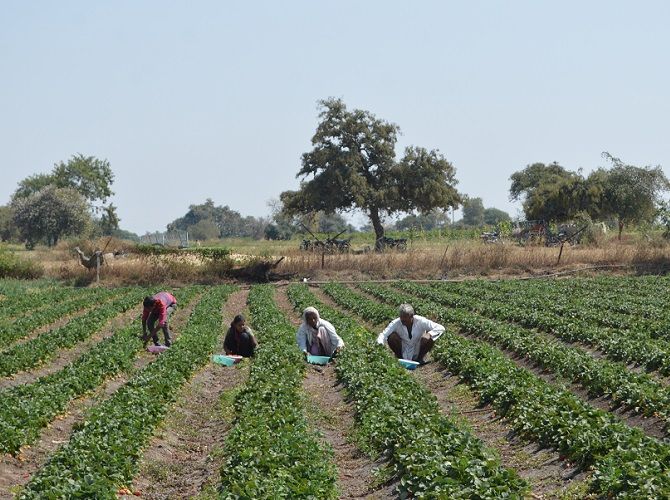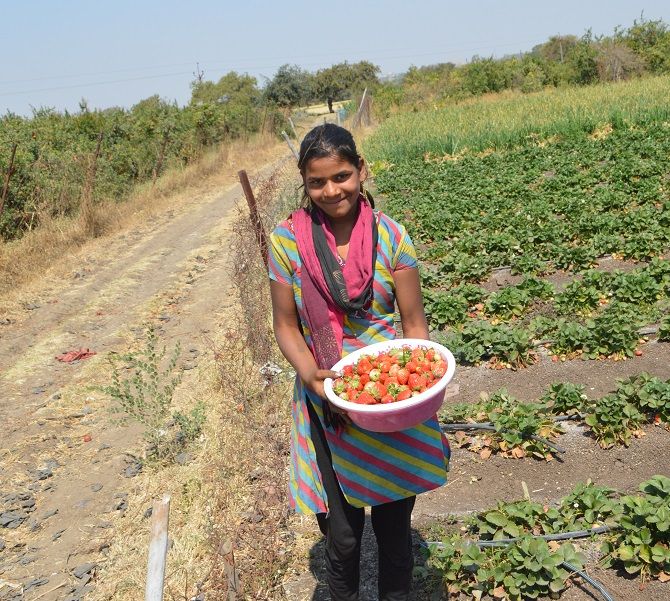While the farmers are not getting remunerative prices for their produce, at the same time they are forced to pay high prices for items they consume. Indivjal Dhasmana reports.

Food inflation tells a story of rural distress even as non-food inflation on both the consumer price index (CPI) and the wholesale price index (WPI) remained above 5 per cent for months in a row.
Depressed farm conditions can be broadly gauged from the wholesale price index (WPI)-based inflation rate. Food items comprising the index witnessed deflation or fall in prices for the fifth month in a row till November 2018.
Though the rate of fall declined in September and October, it again rose in November.
In fact, CPI food prices also declined for the second straight month in November, which means that consumers are not paying high prices for these items.
If one looks at the headline CPI inflation number, it seems the rate is declining across the board.
CPI inflation stood at 2.3 per cent in November, slightly higher than the lower limit of the RBI's mandate. However, WPI food inflation was at 4.6 per cent. The discrepancy was there owing to a high weight of food items over 45 per cent in the CPI. The weight of food items in the WPI is just over 15 per cent.
However, the CPI non-food inflation rate also remained above 5 per cent for the 13th month in a row till November. On the other hand, the WPI non-food inflation rate has been above 5 per cent for the seventh consecutive month now.
Aditi Nayar, principal economist at ICRA, said: "Food prices recording YoY disinflation for five months in the WPI and two months in the CPI do not augur well for rural sentiment and the strength of rural demand."
Devendra Pant, chief economist at India Ratings, said market prices of various produce remained below minimum support prices at various places in the country.
This means most farmers who are in the small and marginal categories do not have enough produce or logistics to come to the market or get institutional credit, he said. So the farm loan waiver policy of the state governments and minimum support price policy of the Centre are not touching the bottom of the pyramid among farmers, he said.
"Whether market prices rise closer to the revised minimum support prices for various crops would crucially affect rural sentiment and demand," said Nayar.
SBI group Chief Economist Soumya Kanti Ghosh argued in favour of replacing loan waivers with other measures. He suggested farmers be given loan renewal, enhancement of loans, and the submission of periodic stock statements (which may be linked to the yearly crop cycles) especially if the bank is satisfied with the farmer in terms of his land holding and paying capacity.
He said waivers would force states to cut capital expenditure, given the lack of limited fiscal space available to states in terms of market borrowing after the implementation of the 14th Finance Commission recommendations.
"Our estimate shows that states like Karnataka, Chhattisgarh, Madhya Pradesh, Rajasthan and Assam will have to cumulatively cut Rs 784.53 billion in capital expenditure if incremental revenue measures are not announced," he said.
CARE Ratings Chief Economist Madan Sabnavis said talk on rural distress had gathered momentum after the results of the five assembly elections even as villages were facing difficult times for some time.

"You have a policy dilemma in the sense there are some gainers and some losers. While consumers gain as is shown in food inflation, farmers are deprived of benefits," he said.
On the other hand, the RBI is focusing on non-food inflation, which remains high, he said.
D K Srivastava, chief policy advisor at EY India, said the inflation figures clearly showed farmers were hit on two fronts. While they are not getting remunerative prices, they are forced to pay high prices for items they consume.











